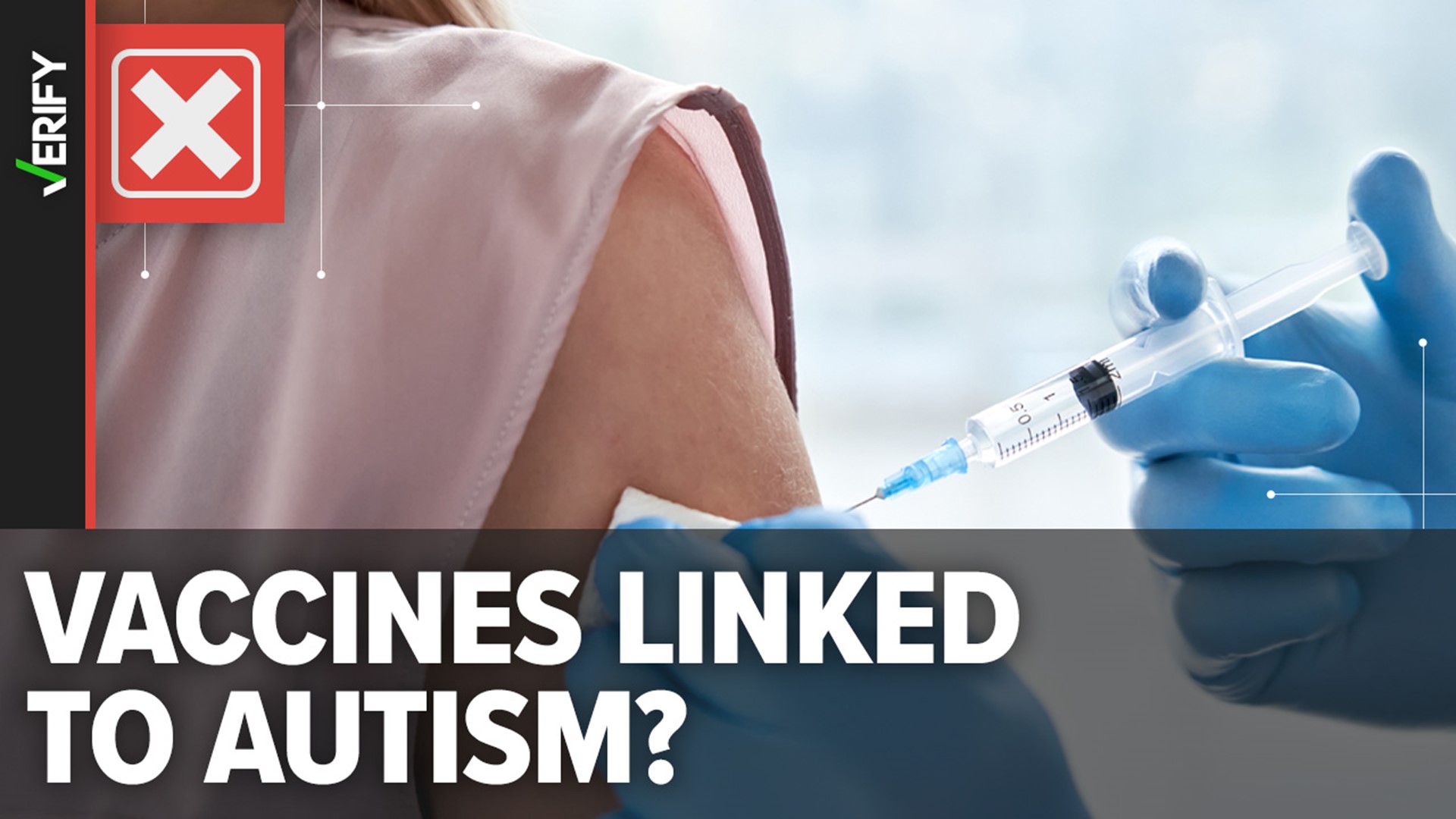Autism spectrum disorder (ASD) is a developmental disability that can cause significant social, communication and behavioral challenges, the Centers for Disease Control and Prevention (CDC) says.
About 1 in 36, or 2.8%, of children have been identified as having ASD, according to the most recent CDC estimates. The developmental disability is nearly four times more common among boys than girls.
Over the years, many people have claimed that vaccines are linked to or cause ASD. Some people have specifically pointed to the measles, mumps and rubella (MMR) vaccine as the culprit.
A VERIFY reader asked if vaccines are linked to autism.
THE QUESTION
Are vaccines linked to autism?
THE SOURCES
- The Centers for Disease Control and Prevention (CDC)
- The Mayo Clinic
- Article published by the Canadian Medical Association Journal (CMAJ) in 2010
- Study published in the Journal of the American Medical Association (JAMA) in 2015
- Jason Hangauer, Ph.D., pediatric psychologist and autism expert at Johns Hopkins All Children’s Hospital
- Juan Dumois, M.D., pediatric infectious diseases physician at Johns Hopkins All Children’s Hospital
THE ANSWER
There is no evidence that vaccines are linked to autism.
A flawed 1998 study that suggested the MMR vaccine causes autism was retracted years later. Since then, the alleged link between vaccines and autism has been debunked by at least a dozen other studies.
WHAT WE FOUND
Autism has “no single known cause,” though genetics and environmental factors may play a role, according to the Mayo Clinic.
Decades of research show no credible evidence linking vaccines to autism.
The claim gained momentum after a 1998 study suggested the MMR vaccine caused autism in children, Juan Dumois, M.D., a pediatric infectious diseases physician at Johns Hopkins All Children’s Hospital, told VERIFY.
But that study was retracted in 2010 after further review.
The Lancet, a British medical journal that originally published the study, said in a February 2010 statement that it became clear “several elements” of the 1998 paper were “incorrect, contrary to the findings of an earlier investigation,” according to an article published by the Canadian Medical Association Journal (CMAJ).
Britain’s General Medical Council ruled earlier that year that some research conducted by Dr. Andrew Wakefield, the study’s lead author, was funded by lawyers acting on behalf of parents involved in lawsuits against vaccine manufacturers. The council also found that Wakefield had “acted unethically and shown ‘callous disregard’ for the children in his study, upon whom invasive tests were performed,” the CMAJ article says.
Since then, the alleged link between vaccines and autism has been debunked by at least a dozen other studies, according to Jason Hangauer, a pediatric psychologist and autism expert at Johns Hopkins All Children’s Hospital.
In 2015, the Journal of the American Medical Association (JAMA) published a large study analyzing the health records of more than 95,000 children with older siblings. About 2,000 of those children were classified as being at risk for autism because they had older siblings diagnosed with ASD.
The research found “no harmful association between MMR vaccine receipt and ASD even among children already at higher risk for ASD,” the study authors wrote.
A Centers for Disease Control and Prevention (CDC) study published in 2013 adds to the research that vaccines do not cause autism.
That study focused on the number of antigens, or substances in vaccines that cause the immune system to produce disease-fighting antibodies, during a child’s first two years of life. It found that increasing exposure to antigens in vaccines was not related to the risk of developing ASD.
Researchers have also studied an ingredient called thimerosal at the heart of many of these claims.
Thimerosal is a mercury-based preservative used in multi-dose vaccine vials to prevent the growth of bacteria. Though thimerosal hasn’t been used in vaccines for children since 2001, there’s no evidence that it is harmful, according to the CDC.
In addition, many studies have concluded that thimerosal does not contribute to the development of autism.
“Even after thimerosal was removed from almost all childhood vaccines, autism rates continued to increase, which is the opposite of what would be expected if thimerosal caused autism,” the CDC says.
The benefits of getting vaccinated are much greater than any possible side effects for almost all children, the Mayo Clinic says. Complications from illnesses that children are vaccinated against, such as polio and diphtheria, can lead to lifelong medical complications, hospitalization and even death.












